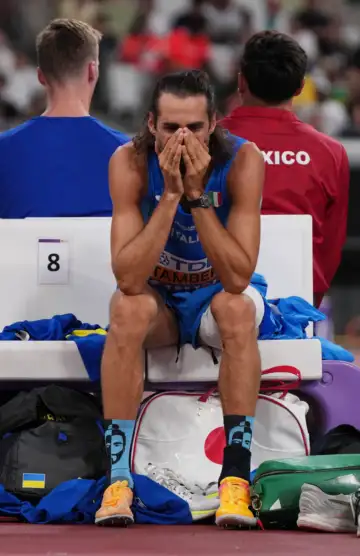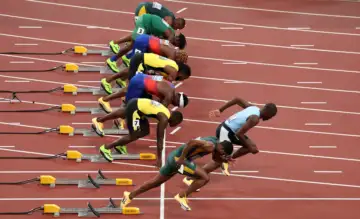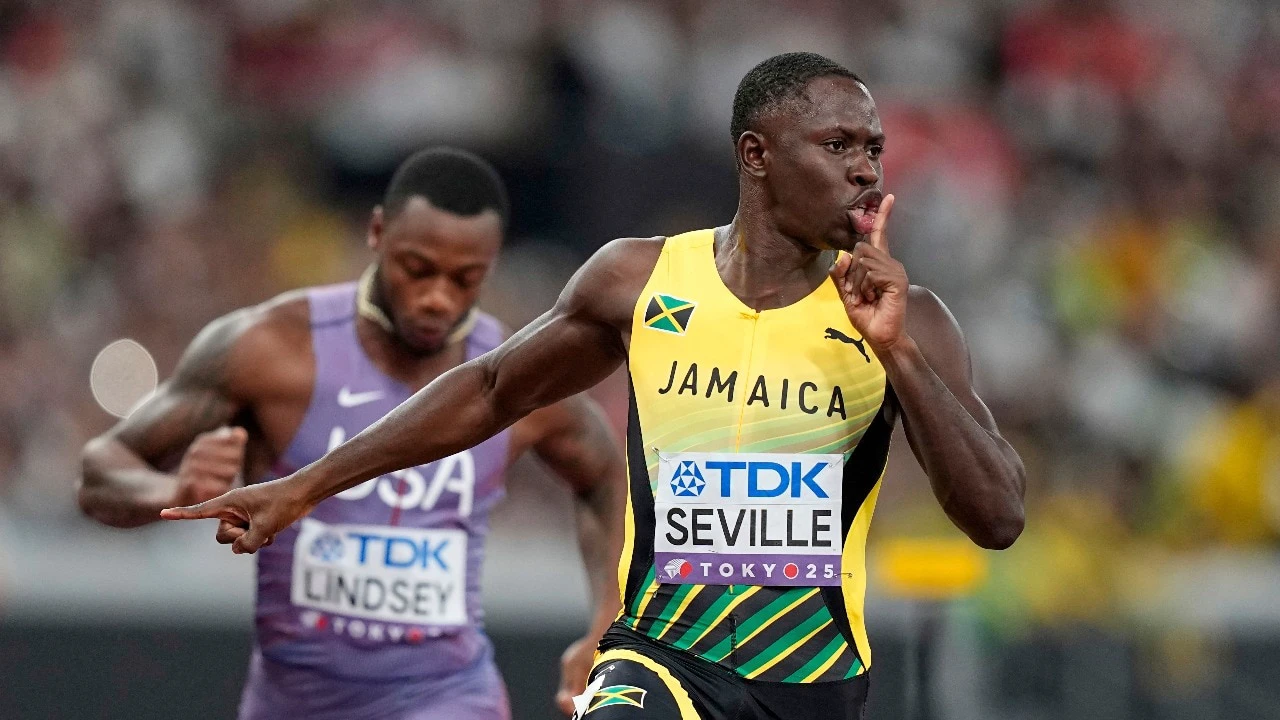It was a damp humid night. Or evening. It depended on how it ended for a few. Close to 60,000 fans had packed in. On the anvil, along with the rest were the two 100m semi-finals, separated by a couple of hours before the power-packed finals.
In between, if you were a fan of a slow burn, came the men’s 10K. Anticipation was rife. In the moisture laden air, you could feel there was a surprise around the corner.
In the high jump qualification, reigning World Champion, the irrepressible and dramatic Gianmarco Tamberi crashed out of the competition. With a bandage on the left thigh, three fatal errors at 2.21, Tamberi went home with a clearance of just 2.16. In earlier interviews, he had announced his intention to continue till the LA 2028 Olympics. The failure in Tokyo would have sobered him down. He would later say, “It’s a pathetic result. I know lows can happen. But it hurts. I knew I could jump over 2.30, otherwise I wouldn’t have left my 20-day old baby girl in Italy. I feel like crap.”
‘I feel like crap’ was a feeling that would endure beyond the high jump, affecting a few world class athletes. The 100m semi-finals in both men and women would set up the stage for the evening’s finale.
 Italy’s Gianmarco Tamberi reacts after failing to qualify. (Reuters Photo)American Melissa Jefferson-Wooden ran the fastest ever 100m semifinal with 10.73. It was the 7th fastest 100m ever recorded at the World Championships. Reigning World Champion, Sha’Carri Richardson qualified for the final as a non-automatic qualifier, her timing, giving her a season’s best of 11.00 to finish third in heat one. In 2023 Budapest, she had qualified as a non-automatic qualifier and then gone onto create history.
Italy’s Gianmarco Tamberi reacts after failing to qualify. (Reuters Photo)American Melissa Jefferson-Wooden ran the fastest ever 100m semifinal with 10.73. It was the 7th fastest 100m ever recorded at the World Championships. Reigning World Champion, Sha’Carri Richardson qualified for the final as a non-automatic qualifier, her timing, giving her a season’s best of 11.00 to finish third in heat one. In 2023 Budapest, she had qualified as a non-automatic qualifier and then gone onto create history.
To the delight of the crowd and a full-throated roar, Shelly-Ann Fraser-Pryce qualified for a record-extending eighth world 100m final in 11.00. Six finalists from the 100m final in Budapest would line-up for the final, late evening in Tokyo
The men’s semi-final went according to form. No big upsets. Kenny Bednarek and Kishane Thompson, clocked 9.85, the second fastest 100m semifinal in World Championships history after Justin Gatlin ran 9.77 in Beijing. Both Kenny and Kishane appeared to be coasting in the last five metres. All eight finalists broke the 10 second barrier in the semifinals. The final promised. The fans restless.
And smack in the middle, came the 10,000m.
10k Run Turns Into Tactical Battle
There has been enough written about the humidity. Yet, this night felt like a wet blanket covered the national stadium. Sweat dripped. There was no hint of a breeze. Tactically, the 27 runners started slowly. In the pack, hunting for a top six slot, was also India’s Gulveer Singh. Gulveer had set a new national record of 27:00.22 at the Ten 2025 meet in San Juan Capistrano, USA. He had broken Surendra Singh’s 28:02.89, that had stood since 2008. Indian fans expected something special.
Seeing the conditions, it was going to be a slow, tactical race. The pack remained close. After a few laps, the waters were tested by Selemon Barega. Uganda’s Chelimo did respond but the pack closed up again, slowing the pace.
For two laps, Japan’s Jun Kasai and Mebuki Suzuki, broke through, leading the pack, to loud cheers from the home fans. Kenya’s Edwin Kurgat took a brief lead handing it back to Norway’s Awet Kibrab.
With 12 laps to go, sweat pouring down the bodies, getting into the eyes, stakes go higher, so is the intensity of the action. None of the top runners want to make a clean break; first the weather doesn’t allow and second, catch-up in a long-distance race actually is possible.
American double Olympic bronze medallist Grant Fisher wriggled his way into the third spot. In the next moments, the group had broken into a single file. The Japanese were lagging now, falling back into the middle.
With six laps to go Fisher once again tried muscling his way into the front. Sweden’s Almgren also took a brief turn at the front. It was at this moment that everyone got a glimpse of French runner Jimmy Gressier. The lead was being swapped, each trying to understand the other, desperately reading something into the race.
With a lap to go, the Ethiopian trio Barega, Kejelcha and Berihu Aregawi pushed up. The others took it as the call, and the scramble began. Kejelcha led the charge at the bell. It was a group of an eight to nine runners who went for broke. Down the final stretch, with the stadium roaring, the runners accelerated, elbows out, jostling for better positions. Fischer responded. Then came the moment, for a brief two seconds, as the athletes fanned out to surge through, Gressier raced through the crack, a bat out of hell, from absolutely nowhere, for a stunning victory. It was a seismic shock. Berihu Aregawi, clutch of silver medals, once again lost out on his first major gold while Barega would always rue whether he made the right calls in the race. For the runner from Boulogne-sur-Mer, northern France, this world title in 28:55.77, the slowest ever in world championships history, would be the sweetest.
India’s Gulveer Singh finished 16th with a timing of 29:13.33. Compare Gulveer’s personal best of 27:00.22 with the winning time or even if he would have run somewhere close to 28:38.63, the timing that fetched him gold in the 2025 Asian Athletics Championships. The if’s and buts of Indian athletics!
And when the 100m women lined up, the stadium buzzed like a giant hacksaw. The last 50 metres dash in the 10K had left everyone breathless.
If form was the indicator, it didn’t disappoint, as USA’s Melissa Jefferson-Wooden, unbeaten all season, powered her way, in a haze of steam, winning her first global title in a championship record of 10.61; fourth on the world all-time list.
Jefferson-Wooden was trailed in by Jamaica’s 21-year-old Tina Clayton in 10.76 with Olympic champion Julien Alfred picking up the bronze in 10.84. Later, in a media interaction, Alfred would say she ran despite pulling her hamstring.
“I came in as a hunter,” Olympic bronze medallist Jefferson-Wooden said. “I have never won a world or an Olympic 100m title, and I worked for that this whole year.”
Despite falling back to a bronze, Alfred was humble. “I am blessed to win this medal,” she said. “It was not my time today. I pulled my hamstring, so we will see for the 200m.”
It was also the end of a glorious era, the stadium standing up to applaud, the 38-year-old Shelly-Ann Fraser-Pryce, who won this title five times between 2009 and 2022, finishing sixth in 11.03, in what would be her last global final.
Seville Serves Surprise in Men’s 100m
The man’s 100m was a surprise. Oblique Seville has had a history of imploding. This time the Jamaican kept it together. At the 2022 World Championship, he was the fastest in the semis but placed fourth in the final. In Budapest, he had the fastest time going into the final but ended up fourth again. In Paris, at the Olympic Games, he finished 2nd fastest in the semi-finals and then came a cropper in the final, finishing 8th. Not in Tokyo. Not in front of Usain Bolt, who saw and watched in a luxury box.
Kishane Thompson seemed to have the distinct advantage at the half-way mark, but Seville pulled away to win in 9.77. Thompson, the Olympic silver medallist followed in 9.82 and then Noah Lyles in 9.89, his best timing since winning the Olympic title in 9.79. Jamaica was back on the top since Bolt retired in 2017.
Olympic 200m Champion, Letsile Tebogo, who had hoped to go one better than his 100m silver in Budapest, was disqualified for a false start. Kenny Bednarek, who with Thompson was the fastest qualifier for the final – both running 9.85 to the same thousandth of a second- had a horror start, failing to pull back into the race, finishing fourth in 9.92.
 Lestile Tebogo is disqualified from 100m sprint. (Reuters Photo)With a reaction time of 0.211, Kenny had lost the opportunity that was building up for a podium finish. Speaking to the media, later, Kenny said: “I just slept in the blocks. I mean, that’s pretty much what it was. I let that one go. Definitely should have been on a podium.”
Lestile Tebogo is disqualified from 100m sprint. (Reuters Photo)With a reaction time of 0.211, Kenny had lost the opportunity that was building up for a podium finish. Speaking to the media, later, Kenny said: “I just slept in the blocks. I mean, that’s pretty much what it was. I let that one go. Definitely should have been on a podium.”
“If I had executed the race well, we would have had a different story. Last race that I ran, I felt there was more in the tank. So yeah, like I said, I just that let that one go. I’m gonna be thinking about this for a very long time.”
In the end, Seville, who had kind of started living in the shadows of the bigger names, ripping open his race jersey to ensure that Jamaica celebrated a first global men’s 100m champion since Bolt achieved the feat at the Rio Olympics in 2016.
After the race Seville said: “Through the years that I’ve been performing, injuries have always stopped me. And this year I showed my dominance throughout the season. I said, ‘Okay, this is my year and I’m going to take this moment and no one else is going to take it away from me.'”
In the end, a remarkable second World Championship Day, full of upsets, dramatic finishes; the ones who took the risk, put in the sacrifice ended up winners.
